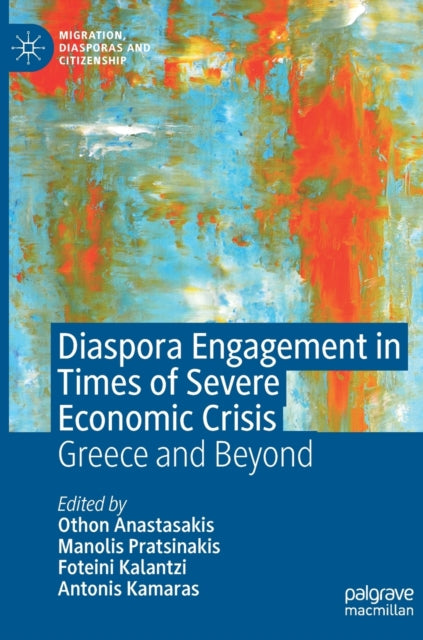Shulph Ink
Diaspora Engagement in Times of Severe Economic Crisis: Greece and Beyond
Diaspora Engagement in Times of Severe Economic Crisis: Greece and Beyond
YOU SAVE £20.04
- Condition: Brand new
- UK Delivery times: Usually arrives within 2 - 3 working days
- UK Shipping: Fee starts at £2.39. Subject to product weight & dimension
Bulk ordering. Want 15 or more copies? Get a personalised quote and bigger discounts. Learn more about bulk orders.
Couldn't load pickup availability
- More about Diaspora Engagement in Times of Severe Economic Crisis: Greece and Beyond
The book explores how the severe economic crisis in Greece impacted diaspora-homeland relations, focusing on transnational mobilization, homeland reform, diasporic institutions, crisis-driven migration, and comparisons with other European countries. It is a valuable addition to the literature on European diasporas.
Format: Hardback
Length: 446 pages
Publication date: 20 June 2022
Publisher: Springer Nature Switzerland AG
The impact of a severe economic crisis on diaspora-homeland relations is a complex and multifaceted issue that requires careful examination. In the context of the present volume, the focus is on exploring diaspora engagement in Greece during the protracted post-2009 eurozone crisis. This crisis is seen as a critical juncture in Greece's relations with its nationals abroad, as it has led to significant changes in the way diasporic communities interact with their home countries.
Transnational mobilization is one of the key aspects of diaspora engagement during a crisis. Diasporic communities often come together to support their home countries, providing financial aid, humanitarian assistance, and political support. This mobilization can take various forms, such as organized protests, social media campaigns, and cultural events. For example, during the Greek economic crisis, diasporic Greeks organized protests and rallies across the world, calling for political change and economic stability.
Homeland reform is another important aspect of diaspora engagement during a crisis. Diasporic communities may pressure their home governments to implement reforms that address the root causes of the crisis. This can include economic policies that promote job creation, social welfare programs, and political stability. For example, during the Greek economic crisis, diasporic Greeks pressured their government to implement austerity measures and economic reforms to address the country's financial crisis.
The role of diasporic institutions is also crucial in diaspora engagement during a crisis. Diasporic communities often establish institutions that serve as a bridge between their home countries and their communities abroad. These institutions can provide education, cultural exchange, and social support to diasporic communities. For example, during the Greek economic crisis, diasporic Greeks established organizations that provided financial aid and legal assistance to those affected by the crisis.
Crisis-driven migration is another significant aspect of diaspora engagement during a crisis. Diasporic communities may be forced to migrate due to economic or political instability in their home countries. This migration can have both positive and negative impacts on the diaspora and their home countries. For example, diasporic migration can provide a source of labor and economic growth in receiving countries, but it can also lead to social and cultural tensions between diasporic communities and their host communities.
Comparisons with other countries in Europe are also made in the present volume to shed light on the unique challenges and opportunities faced by diasporic communities in different contexts. This comparison can help us understand the broader trends and patterns in diaspora engagement during a crisis.
In conclusion, the present volume provides a compelling and original interdisciplinary study of contemporary diaspora issues, through the lens of an advanced economy and democracy facing a prolonged crisis. It is a significant addition to the literature on European diasporas, as it offers valuable insights into the ways in which diasporic communities respond to and navigate economic crises. By exploring the various aspects of diaspora engagement, including transnational mobilization, homeland reform, the role of diasporic institutions, crisis-driven migration, and comparisons with other countries, this book contributes to our understanding of the complex dynamics between diasporic communities and their home countries.
Weight: 734g
Dimension: 210 x 148 (mm)
ISBN-13: 9783030974428
Edition number: 1st ed. 2022
This item can be found in:
UK and International shipping information
UK and International shipping information
UK Delivery and returns information:
- Delivery within 2 - 3 days when ordering in the UK.
- Shipping fee for UK customers from £2.39. Fully tracked shipping service available.
- Returns policy: Return within 30 days of receipt for full refund.
International deliveries:
Shulph Ink now ships to Australia, Belgium, Canada, France, Germany, Ireland, Italy, India, Luxembourg Saudi Arabia, Singapore, Spain, Netherlands, New Zealand, United Arab Emirates, United States of America.
- Delivery times: within 5 - 10 days for international orders.
- Shipping fee: charges vary for overseas orders. Only tracked services are available for most international orders. Some countries have untracked shipping options.
- Customs charges: If ordering to addresses outside the United Kingdom, you may or may not incur additional customs and duties fees during local delivery.


